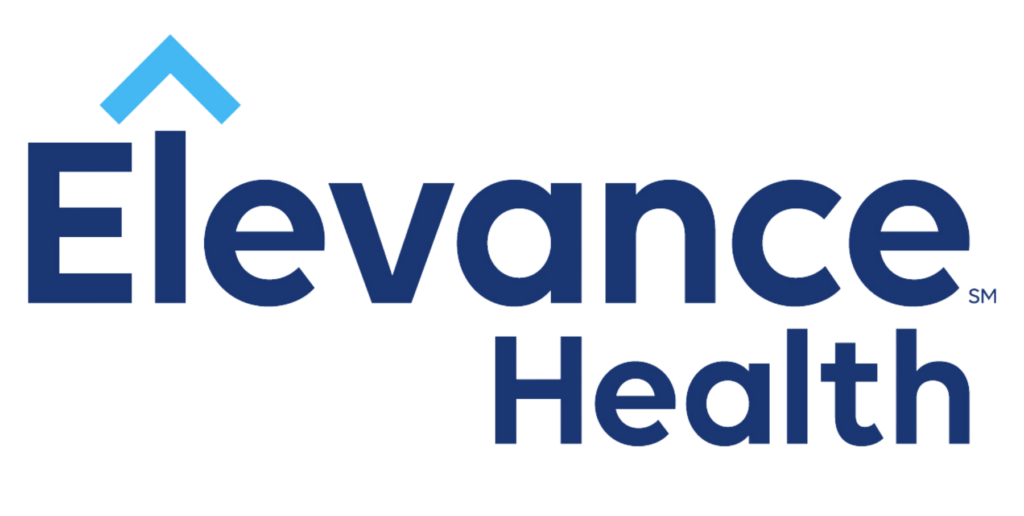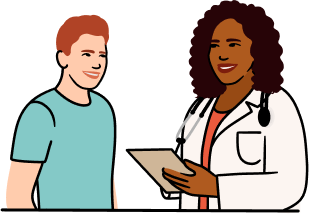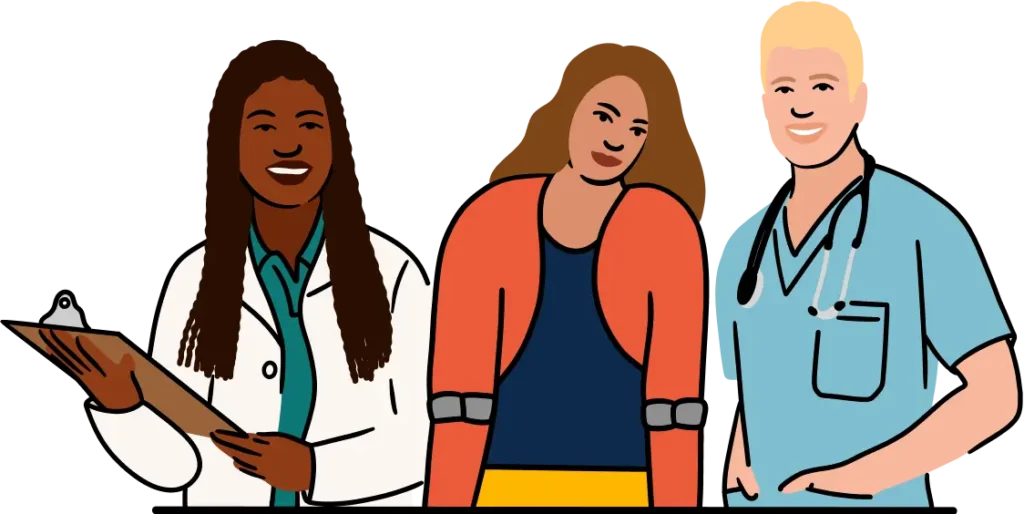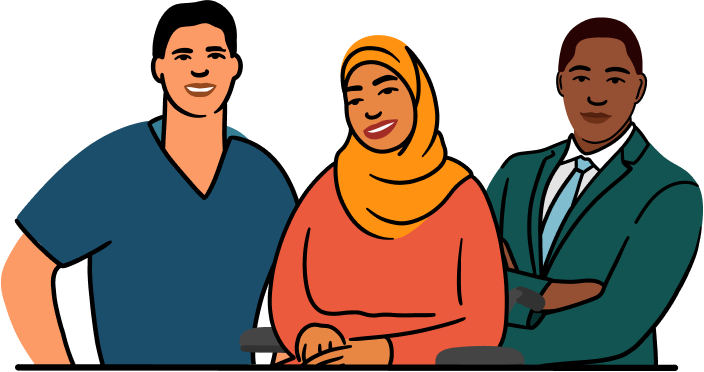Changing How Healthcare is Paid For
IIDDEAL (Individuals with IDD Engaged, Aligned, and Leading): Outcomes That Matter
A project to develop consensus on what health and life outcomes are the highest priority for people with intellectual and/or developmental disabilities (IDD) and identify corresponding quality measures.
Changing How Healthcare Outcomes are Measured to Ensure Person-Centered Care
IEC launched the IIDDEAL project, in partnership with Augusta University, to identify priority health outcomes that matter to people with IDD and their families. The project also identifies how clinicians, payers, and regulators can support those outcomes. Ultimately, the project will create a detailed plan that helps measure, improve, and ensure better healthcare for people with IDD.
These health outcomes are intended to inform future research, guide healthcare and insurance decision-making, and, ultimately, improve the quality of life for people with IDD. The project takes a person- and community-centered approach, actively involving people with IDD and their care partners/givers in project leadership and as key contributors alongside clinicians and other healthcare stakeholders.
- 1 in 20 Americans have IDD
- 4x: how much more likely a person with IDD is to be mistreated by healthcare professionals than a person without IDD
- 4x: incidence of maternal mortality for women with IDD over women without IDD
- 30% of people with IDD experienced adverse events during hospital visits
Why This Matters
For individuals with IDD, accessing high-quality healthcare that aligns with their unique needs and preferences has been a longstanding challenge. The traditional healthcare research and decision-making processes often fall short of capturing the diverse experiences and priorities of this population.
People with IDD are historically underrepresented in research, clinical leadership, and policymaking, leading to a lack of comprehensive understanding of their healthcare needs. Furthermore, the results evaluated in research, quality improvement efforts, or financial mechanisms that hold clinicians responsible for their patients’ outcomes do not always reflect the priorities of individuals with IDD. Community members want to focus on areas such as daily functioning, social participation, and overall well-being.
This disconnect has resulted in a fragmented healthcare landscape that fails to deliver care for people with IDD that is person-centered, equitable, and helps them achieve their goals.
IIDDEAL Highlights
Swipe left/right to navigate
2022
Phase 1: Formed partnerships with Augusta University, Brandeis University, 44 self-advocates, 39 care partners, and 28 other healthcare leaders, including payers, researchers, policymakers, and others.
2023
Phases 1 & 2: Held in-person health outcomes framework consensus meeting. The consensus workgroup included 35+ members, who met virtually from May 2023 to September 2023 before convening in Washington, DC, to drive goals for the health outcomes framework.
2023
Phases 1 & 2: Held first IIDDEAL Policy Summit. Attendees included representatives from federal and state agencies, healthcare quality-focused nonprofits, and funders.
2024
Phase 2: Hosted a second IIDDEAL Policy Summit to share project learnings with additional healthcare and disability leaders.
2024
Phase 2: Will be releasing IDD Health Outcomes That Matter: Community-Led Standards for Improvement, a consensus health outcomes framework, for public comment.
2024
Phase 3: Build on previous IIDDEAL projects to create consensus on a set of quality measures.
IDD Health Outcomes That Matter: Community-Led Standards for Improvement
True health is more than just vital signs. For people with IDD, well-being encompasses a holistic set of outcomes that matter most to them as individuals. This consensus framework defines the nine Health Outcome Domains and 29 Priority Elements that healthcare leaders must focus on, representing the perspectives of the IDD community.
By centering the lived experiences of people with IDD and their care partners/givers, we can transform healthcare to provide personalized supports that improve quality of life.
IIDDEAL Project Members
The IIDDEAL Project Group is a diverse coalition that includes people with IDD, care partners/caregivers, clinicians, researchers, and other healthcare leaders. The Project Group operates collaboratively, based on the principles of Authentic Community Engagement – learning from the lived experience of people from IDD and the perspectives of healthcare professionals and creating commonsense solutions.
Click on each to expand
Project Lead
- Mai Pham, President and CEO, IEC
- Teal Benevides, Associate Professor, Institute of Public and Preventive Health, Augusta University
- Joanne Nicholson, Brandeis University
Project Team
- May-Lynn Andresen, Director of Community Partnerships, IEC
- Madelyn Bahr, Senior Program Specialist, IEC
- Reid Caplan, Accessibility Consultant
- Tim Corey, Graphic Facilitator
- Kristen Faughnan, Brandeis University
- Jen Jaremski, Augusta University
- Melissa MacKay, Brandeis University
Project Stakeholder Core Team
- General Clinician Lead: Helen Burstin, CEO, Council of Medical Specialty Societies (CMSS)
- Payer/Regulator Lead: Carolyn S. Langer, Regional Vice President, Senior Clinical Officer for the NY, CT, NH, and ME, Anthem, Inc.
- Self-Advocate Lead: Stephen Shore, Self-Advocate and Professor, Adelphi University
- IDD-Specialty Clinician Lead: Vincent Siasoco, Assistant Professor, Department of Family and Social Medicine and Department of Pediatrics, Albert Einstein College of Medicine
- Family Care Partner Lead: Sequaya Tasker, Senior Executive Officer of Program Initiatives, The Arc, National Office
Project Advisory Council
- Kruti Acharya, Associate Professor of Disability and Human Development and Pediatrics, University of Illinois Chicago
- Karla Ausderau, Associate Professor, Department of Kinesiology Occupational Therapy Program, University of Wisconsin–Madison
- Kayte Barton, Self-Advocate
- Chester Finn, Self-Advocate and Co-Founder, Community Empowerment Programs Inc.
- Merrill Friedman, Elevance Health
- Susan Hingle, Associate Dean for Human and Organizational Potential and Director of Faculty Development, Southern Illinois University School of Medicine
- Tracy Jirikowic, Clinical Researcher, University of Washington Fetal Alcohol Syndrome Diagnostic and Prevention Network
- Khalilah R. Johnson, Assistant Professor, Division of Occupational Science and Occupational Therapy, University of North Carolina School of Medicine
- Arethusa Stevens Kirk, National Senior Medical Director and East Region Medical Officer, UnitedHealthcare Community & State
- Sharon Lewis, Principal, Health Management Associates (HMA)
- Morénike Giwa Onaiwu, Self-Advocate and Innovation & Digital Communication Director, the Autistic Women and Nonbinary Network
- Ivanova Smith, Self-Advocate and Faculty, Neuro-developmental and Related Disabilities (LEND) Department, University of Washington Leadership Education
- Mary Sowers, Executive Director, National Association of State Directors of Developmental Disabilities Services (NASDDDS)
National Consensus Workgroup
- May-Lynn Andresen
- Rebecca Anhang Price
- Karla Ausderau
- Teal Benevides
- Madelyn Bahr
- Jeffrey Brosco
- Helen Burstin
- Tim Corey
- Marco Damiani
- Tim Engelhardt
- Lauren Erickson
- Kristen Faughnan
- Chester Finn
- Morénike Giwa Onaiwu
- Alexis Hernandez-Hons
- Susan Hingle
- Matt Holder
- Arethusa Kirk
- M. Dian Chin Kit-Wells
- Carolyn Langer
- Penelope “Penny” Lema
- Thomas Mangrum
- Adam Myers
- Joanne Nicholson
- Patricia (Pat) Nobbie
- Hoangmai (Mai) Pham
- Bob Phillips
- Susan Platkin
- Rick Rader
- Linda Shaughnessy
- Stephen Shore
- Vincent Siasoco
- Julie Siebert
- Mike Skoch
- Ivanova Smith
- Maura Sullivan
- Sequaya Tasker
- Huan Vuong
IEC is grateful for the following funders, whose support makes IIDDEAL possible:




Making Healthcare Better and Safer for People with IDD
IEC partners with people with lived experience of IDD and healthcare professionals to change the way care is taught, delivered, and paid for by creating new programs that center patients.
IDD Health Outcomes That Matter: Community-Led Standards for Improvement
True health is more than just vital signs. For people with IDD, well-being encompasses a holistic set of outcomes that matter most to them as individuals. This consensus framework defines the 43 National Goals, nine Health Outcome Domains, and 29 Priority Elements that healthcare leaders must focus on, representing the perspectives of the IDD community.
By centering the lived experiences of people with IDD and their care partners/givers, we can transform healthcare to provide personalized supports that improve quality of life.




